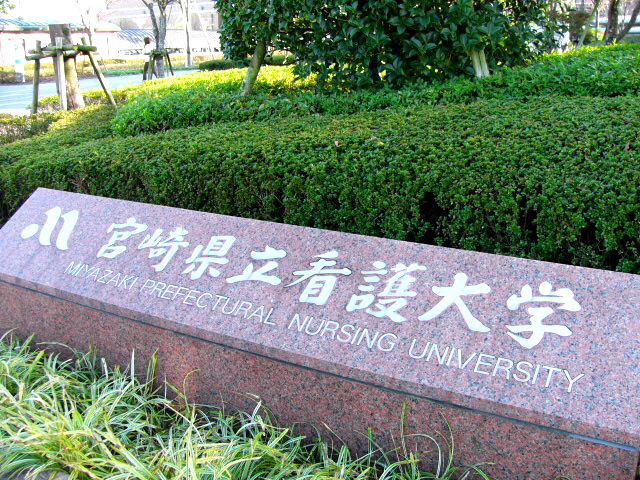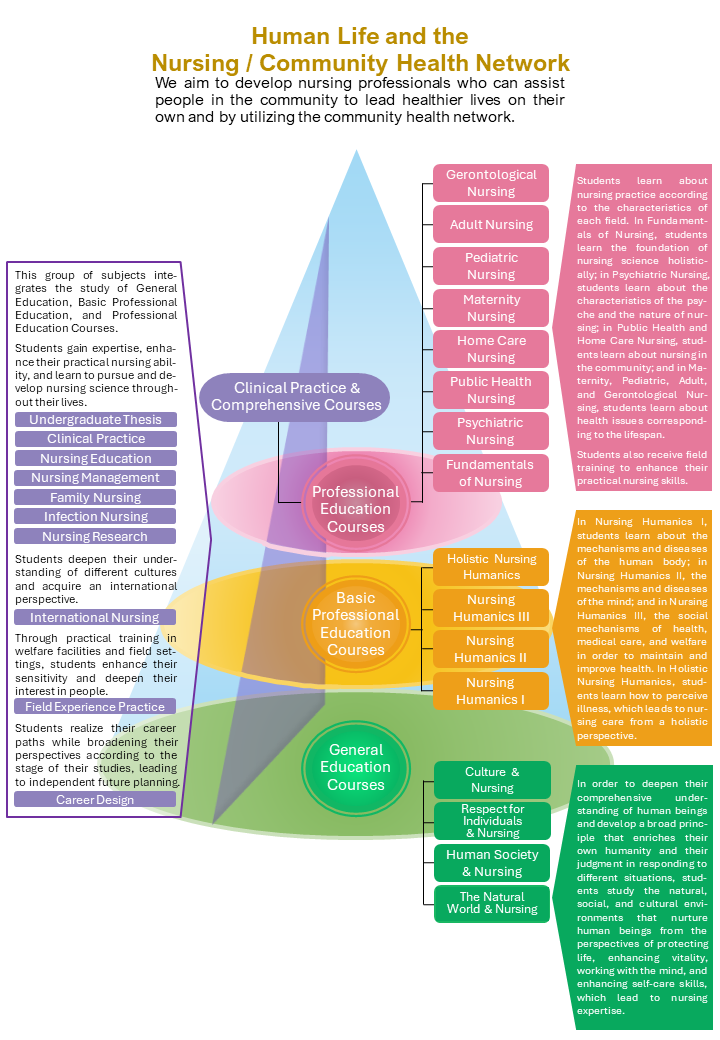Philosophy & Educational Objectives
Educational Philosophy and Purpose
We strive to educate nursing specialists grounded in the dignity of life and able to contribute broadly to the improvement of human health and welfare and the development of nursing science and related academic fields.

Educational Objectives
- To develop a strong sense of empathy and ethics; to foster sensitivity for sharing the joy, sadness, pain, and hardship of others and the ability to offer assistance warmly.
- To cultivate the ability to consider the surrounding natural, social, and cultural relationships from a comprehensive perspective and to respond to social changes and scientific developments proactively and creatively.
- To foster practical problem-solving skills enabling the acquisition of specialized knowledge and techniques to work with people in different health conditions, identify individual nursing needs, and respond based on scientific evidence.
- To instill a sense of pride and responsibility in the nursing profession, a continued pursuit of the role of nursing, and the ability to coordinate with other medical, healthcare, and welfare professionals.
- To nurture a lifelong attitude toward self-improvement, the ability to work creatively, and the fundamental skills needed to contribute to the development of nursing science.
3 Policies
Admission Policy
Based on our Philosophy and Educational Objectives, we seek students:
- Who are interested in human health and lifestyle and working to develop the ability to regulate their own lives;
- Who can engage with others actively, listening to what they have to say, as well as express their thoughts and ideas in their own words;
- Who respect diverse personalities and different ways of thinking, appreciate those around them, and are willing to grow together;
- Who have an interest in social trends and curiosity for the unknown and are open to new things and change;
- Who have the academic skills fundamental to university study and are willing to learn and think independently.
Curriculum Policy
Based on Nightingale’s Theory of Nursing aspiring to the learning and practice of health for all people, our curriculum aims to develop nursing professionals who know the value of life, enhance people’s vitality, work with the heart and mind, and support the self-care and self-control of others. The curriculum is designed to foster a scientific perspective and enable students to acquire concepts and practical skills in a stepwise, integrated manner through experiential learning.
We also adopt educational methods promoting students’ independent learning and creating an environment to increase student achievement based on their needs. Evaluation criteria and course standards are furthermore stated clearly in the syllabus to ensure rigorous and objective grading.
- To deepen students’ comprehensive understanding of humanity and cultivate a wide range of enriching liberal arts and the ability to make appropriate decisions, our General Education Courses are designed for studying the natural, social, and cultural environment surrounding us as human beings.
- The program includes Basic Professional Education Courses looking more deeply at the physical, mental, and social relationships of the human subjects of nursing and deepening understanding of these systems.
- Students learn the concepts and methods that form the foundation of nursing, view the subject of nursing as an individual human being leading a life as a family member in the community, and comprehend nursing expertise as positioned within a network of health promotion.
- Clinical Practice and Comprehensive Courses are designed to integrate studies in General, Basic, and Professional fields while enhancing practical nursing skills and enabling students to pursue and develop their nursing learning throughout their lives. Additionally, for the purpose of garnering an international perspective, education geared toward cross-cultural understanding is provided.
- We educate students in cooperation across subjects and fields to foster an approach of pursuing deeper understanding, to experience the meaning and enjoyment of working on problem solving, and to develop a future-oriented attitude toward research.
- Based on interactive classes in which students learn through self-evaluations in light of achievement goals, classes are conducted through student participation in small group work and audiovisual materials and educational media. In the Professional Educational Courses, to promote independent learning, a system of self-study–group study–individual guidance–self-evaluation has been introduced.
Diploma Policy
Based upon our educational principles, a Bachelor of Science in Nursing (BSN) is awarded to those who have earned the prescribed credits and acquired the following abilities corresponding to our Educational Objectives:
- An understanding of human beings and a sense of ethics; the sensitivity to share others’ joys, sorrows, pains, and sufferings; and the ability to give of oneself;
- A respect of diverse personalities and different ways of thinking and the ability to build relationships with others;
- A comprehensive consideration of the natural, social, and cultural relationships surrounding people, an interest in changes in social conditions and the development of science and technology, and a proactive attitude toward learning;
- The specialized knowledge and skills to work with individuals in various health conditions and the fundamental ability to identify individual nursing needs and practice based on scientific evidence;
- A sense of pride and responsibility as nursing professionals; a pursuit of the role of nursing; and the ability to collaborate with those in related fields, such as health, medicine, and welfare;
- A lifelong commitment to self-improvement, the ability to work creatively, and the fundamental skills to contribute to the development of nursing science.
Curriculum
Curriculum Model

General Education Courses
Students learn about the natural, social, and cultural environments that nurture human beings in order to develop nursing expertise with a focus on protecting life, enhancing vitality, encouraging others, and improving means of self-care. Students also gain a deeper comprehensive understanding of human beings, while enriching their own humanity, and cultivating the ability to make decisions responding appropriately to each situation.
- Culture & Nursing
- Respect for Individuals & Nursing
- Human Society & Nursing
- The Natural World & Nursing
Basic Professional Educational Courses
Students progress through their nursing study by learning about the structure and illnesses of the body in Nursing Humanics I and the construct and illnesses of the mind in Nursing Humanics II and, in Nursing Humanics III, the social makeup of health care, medical care, and welfare for the maintenance and improvement of health.
- Nursing Humanics I
- Nursing Humanics II
- Nursing Humanics III
Professional Educational Courses
Students learn the characteristics of nursing practice appropriate in the respective fields of fundamentals of nursing, mental health and psychiatric nursing, public health nursing in the community, and life cycle-related health issues.
- Gerontological Nursing
- Adult Nursing
- Pediatric Nursing
- Maternity Nursing
- Community Health Nursing
- Home Care Nursing
- Public Health Nursing
- Psychiatric Nursing
- Fundamentals of Nursing
Comprehensive and creative learning is implemented to combine and further develop nursing expertise based on learning outcomes.
Clinical Practice & Comprehensive Courses I
- Clinical Practice III
- Clinical Practice II
- Clinical Practice I
- Field Practice II
- Field Practice I
- Health Support Training
Clinical Practice & Comprehensive Courses II
- Nursing Research
- Family Nursing
- Infection Control Nursing
- Graduation Research
- Nursing Skills Training
- Nursing Administration
Practical nursing abilities, personal sensitivity, and concern for others are enhanced in step-by-step clinical practice through hands-on training in institutions such as welfare facilities.
Departments
General Education Courses
Students study the natural, social, and cultural environment which nurtures people in order to deepen their comprehensive understanding of human beings, cultivate a broad range of enriching liberal arts, and develop the ability to make judgments and respond when necessary.
The Natural World & Nursing: Preserving Life
Learning about the natural world surrounding humans, including air, water, and food, as well as the effects of nature on humans
Human Society & Nursing: Enhancing Vitality
Learning about the structure and institutions of lawful society, the basics of information science, and athletics
Respect for Individuals & Nursing: Working with the minds of others
Learning about human mindsets, how relationships are formed, and the languages of other countries
Culture & Nursing: Improving Self-Care
Learning about the culture and history of society, as well as music and art as self-care and healing methods
Basic Professional Educational Courses
Students learn the knowledge and ideas which serve as the basis for nursing practice by understanding the physical, mental, and social aspects of human beings and integrating these aspects to view illness holistically.
Nursing Humanics I: Body Mechanics & Disease
Learning about the structure and functions of the human body, disease states, and the recovery process
Nursing Humanics II: Mechanisms & Illnesses of the Mind
Learning about the developmental characteristics of the human psyche, mental illness, and factors influencing human development
Nursing Humanics III: Social Structures
Learning how to assess the health of a community and how health and welfare function
General Nursing Humanics
Learning how to view illness in a way that leads to nursing care from a holistic perspective
Professional Educational Courses
In Fundamentals of Nursing, students learn nursing theory and basic techniques. In Psychiatric Nursing, students learn the theories and methods of mental health care for social independence. In Public Health Nursing, students learn nursing that supports the healthy lives of people in the community. In Home Care Nursing, students learn nursing care for people recuperating in the community. In Maternity, Pediatric, Adult, and Gerontological Nursing, students learn theories and methods corresponding to the life cycle of people and the characteristics of each subject. Additionally, each of these eight areas provides students with practical nursing training. In Integrated Nursing, students study courses that integrate, evaluate, and develop career design and experiences that lead to highly specialized courses and independent future planning.
Fundamentals of Nursing
Learning about nursing theory and foundational nursing skills
Psychiatric Nursing
Learning about the theory and methods of how to prepare individuals for social independence
Public Health Nursing
Learning the theories and methods to maintain and promote the health of individuals, families, groups, and communities; prevent disease; and improve the quality of life
Home Care Nursing
Learning nursing care for those who are recuperating at home and those who have difficulties in their lives, as well as their families
Maternity Nursing
Learning about nursing care for the healthy birth and growth of the next generation
Pediatric Nursing
Learning about nursing care for children’s healthy upbringing
Adult Nursing
Learning about the characteristics and nursing care of adulthood
Gerontological Nursing
Understanding the health issues of the elderly population and learning about nursing practice for this population
Integrated Nursing
Studying subjects that integrate, evaluate, and develop career design and experiences that lead to proactive future planning, as well as highly specialized subjects
Integrated Nursing
This group of subjects integrates the studies of General, Basic Professional, and Professional fields.
Students acquire expertise, enhance their practical nursing skills, and learn to pursue and develop nursing science throughout their lives.
- Graduation Research
- Clinical Practice
- Nursing Education
- Nursing Management
- Family Nursing
- Infection Nursing
- Nursing Research
Students deepen their understanding of different cultures and acquire an international perspective.
- International Nursing Theory
Through practical training at welfare facilities and other settings in the field, students enhance their sensitivity and deepen their interest in people.
- Field Practice
Students broaden their perspectives and realize their career paths according to their stage of study, leading to independent future planning.
- Career Design


